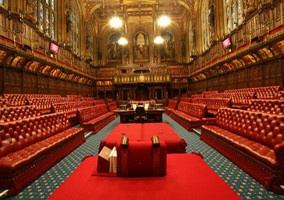Charities have called on the government to exempt them from proposed legislation they claim could cost them millions in charitable funds.
The Church of England warned that charities could lose millions if changes related to “marriage value” as part of the leasehold and freehold reform bill are introduced.
Marriage value refers to an increase in a property’s value that arises when its lease is extended.
This increase in value is currently shared equally between the landlord and leaseholder when the remaining lease term is for less than 80 years.
The bill, currently in the committee stage of the House of Lords, proposes the abolition of marriage value.
Charities that own freehold properties to be impacted
Speaking in the House of Lords last month, the Bishop of Manchester called for charities to be exempted from the legislation changes.
“My concerns are with particular reference to charities who own freehold as part of their permanent endowment.
“We have already heard that some 80% of marriage value in UK relates to properties in and around central London.”
The scrapping of marriage value would benefit leaseholders by making it cheaper to buy their homes, he said, but it would have a detrimental impact on some charities.
“The Church Commissioners’ Hyde Park properties have an average sale value of £1m. Those who own them are not, by and large, London’s poor.
“This bill, as drafted, will take money presently used for charity purposes and give it to the wealthy – robbing the poor to pay the rich: a reverse Robin Hood.”
He also gave the example of grantmaker John Lyon’s Charity, saying that the abolition of marriage value could cause it to lose £3m per year.
“John Lyon’s is not the kind of rogue landlord that leaseholders need protecting from,” he said.
“It is a widely accepted principle of charity law, accepted even when right-to-buy legislation was extended from council housing to many housing association tenants, that charity assets should not be transferred to individuals or bodies that would not qualify as their beneficiaries.
“This bill seems to fly in the face of that principle. Is it possible to exempt charities?”
Church Commissioners: ‘Transfers wealth from charities to wealthy individuals’
A spokesperson from the Church Commissioners said while the charity supports the “broad thrust” of the proposed legislation it raises issues with the scrapping of marriage value and asks for charities to be exempt from it.
“The proposal to abolish marriage value amounts to a transfer of wealth from charities like us to wealthy individuals who own property in prime parts of London.
“For us, that means there is less money to spend on looking after those in greatest need.
“What we are seeking is an exemption for charities to the proposed abolition of marriage value, in view of the public benefit that charities provide, which would otherwise have to be scaled back."
Charities’ Property Association: ‘A great concern’
Helen Donoghue, secretary of Charities’ Property Association, said it was a “serious issue” for charities that own properties and rely in income from them to support their activities.
“As the bishop spelt out so clearly, these funds are used to support a wide range of charitable activities and the loss of this income at a time when their services are needed more than ever is of great concern,” she said.
“Historically, governments have recognised the special nature of charity property ownership and have provided protection for charities from various leasehold reforms: we urge them to extend this protection in this case.”
Meanwhile, a spokesperson from Charity Tax Group said: “This well-intentioned legislation could have the unintended consequence of depriving charities of valuable resources that are currently used to support a wide range of charitable services from medical research to grant-funding community activities and supporting local projects in deprived areas.
“We urge the government to rethink the legislation to exempt properties owned by charities from this provision.”
DLUHC: ‘Bill will improve homeownership for millions’
A spokesperson from the department for levelling up, housing & communities (DLUHC), said: “Our leasehold and freehold reform bill will improve homeownership for millions across England and Wales by making it cheaper and easier for leaseholders to extend their lease or buy their freehold.
“Removing marriage value will level the playing field and simplify the system for leaseholders with 80 years or fewer remaining on their lease.”
The department said it recognised the positive contributions that charities make to society but that carving out specific groups of landlords not implicated by the new legislation would complicate a system it is aiming to simplify.












